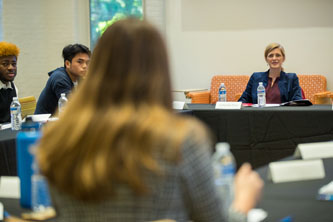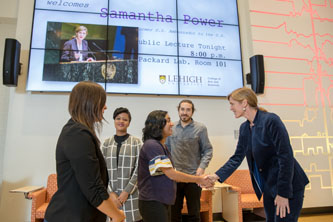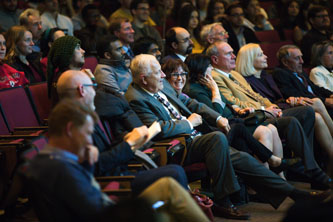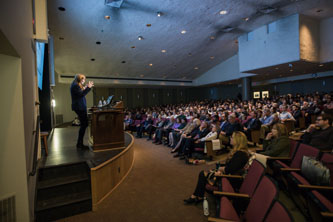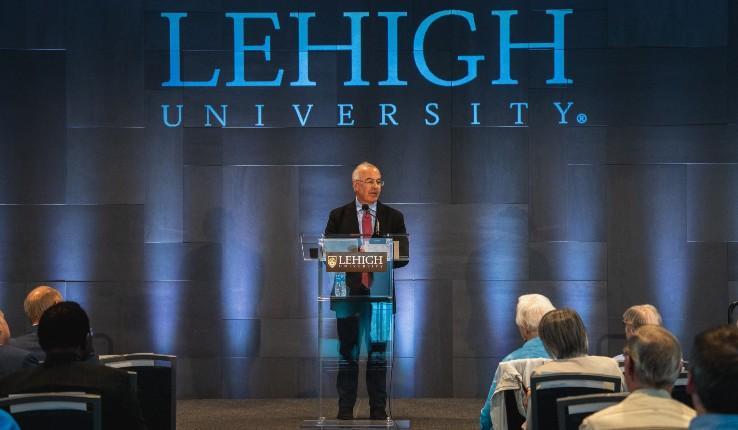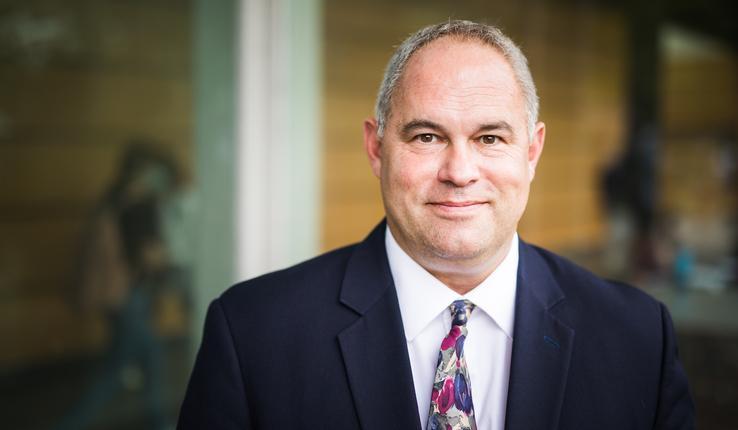Samantha Power: 'Change What Seems Possible'
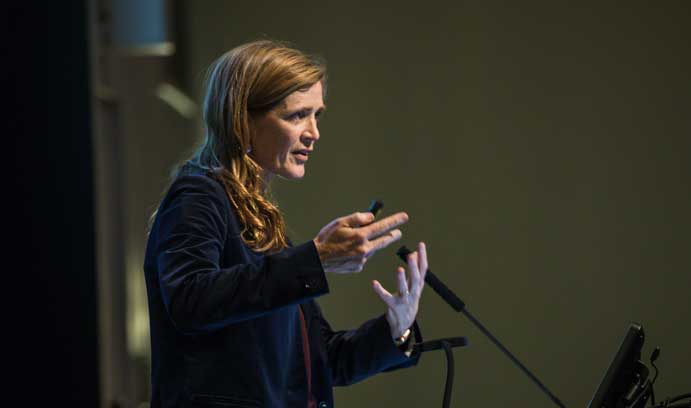
Samantha Power delivers the second Peter S. Hagerman '61 Lecture in Ethics. (Christa Neu)
It was early in President Barack Obama’s second term, and Samantha Power, who was then a special assistant to the President and senior director for multilateral affairs and human rights at the National Security Council, was at the White House for a dinner. Except instead of mingling or discussing business, Power was in a corner on the phone arguing with her stepfather, Eddie.
There was an issue at home. Power had left her 11-month-old daughter with her stepfather, who, thinking he had milk, was trying to bottle feed Power’s daughter rice pudding. President Obama overheard the argument and grabbed the phone.
“He’s like ‘I got this,’” Power said. “And he takes the phone out of my hand, and he’s like ‘Eddie, Eddie, no, no, no, no, no. First thing is, deep breath. Second thing is, I’m the President of the United States. You have got to find the milk.’”
As Power, frazzled, tried to get her bearings, Obama had more important issues to discuss: Tom Donilon was resigning as national security adviser, he was going to tap U.S. Ambassador to the United Nations Susan Rice to fill the vacancy, and he wanted to nominate Power to take Rice’s position as ambassador. Suddenly, the embarrassing interaction between her stepfather and the president was the last thing on her mind.
Power shared the story Oct. 18 in a 45-minute question-and-answer session that followed her nearly hour-long address, “Changing Your Slice of the World,” as the second Peter S. Hagerman '61 Lecture in Ethics.
The story was prompted by a student inquiry on her biggest fear upon learning she was being nominated to become the U.S. Ambassador. She told the audience that filled Packard Lab, Room 101, that her appointment was being vetted by a score-settling U.S. Senate. Power, who eventually became the youngest-ever U.S. Ambassador to the United Nations, was worried about distortion and posturing nonsense that could embarrass the president and tried to review every word she had ever written and think of any video clips that existed of her.
Accompanied by a slide show, Power began the lecture by listing a number of major world problems, including 70 million people displaced (more than by Hitler, she noted), climate change and income inequality. A slide behind her showed photos of Russian President Vladamir Putin and Chinese President Xi Jinping, a tombstone inscribed with “R.I.P. Newspapers,” President Donald Trump, the Unite the Right rally in Charlottesville, Va. and an illustration of cyber attacks all surrounding a very small picture of Power with the words, “What can one little person do?” Power wanted to make the point that with problems that great, it’s easy for people to feel helpless.
“My feeling, having done a vast internal survey, given the scale of some of the problems in the world right now, many, many, many individuals are feeling particularly small these days,” Power said, “feeling as if the problems are so big, what can one individual do about problems this large?”
Power spent the night proposing and explaining three modest steps she feels everyone can take to make a difference, regardless of the size of the issues: “Change What Seems Possible,” “Shrink the Change” and “Politics, Politics, Politics.”
Changing what seems possible, Powers said, is a way of saying numbers, symbols and one’s sense of what is possible all matter. She said being self-conscious about the signals one sends can make a difference.
Using President Obama’s appointment of the highest number of women to cabinet-level positions as an example, Power said what the public sees matters. She said CNN, Fox News and MSNBC chose men as commentators for foreign policy segments 80 percent of the time, on average, between 2014 and 2016. She said the editorial pages of newspapers heavily favor male authors and two-thirds of international relations professors in the United States are men.
Power mentioned the Lehigh students she met with earlier that afternoon, many of whom were women, and stressed how important the impact of what they’re seeing has on them.
"Ensuring that those women are seeing women who are older, like them, in these roles, may have a bearing on what they think is possible for them,” Power said. “It’s another reason I’m very glad to be here as a representative of women who do engage in national security.”
In explaining “Shrinking the Change,” Power spoke about how big problems are rarely solved with one giant solution. It takes many small steps over time, she said, to make a dent in the larger issue. It can happen in a few weeks, or may take decades, she said.
Whenever she felt too small to solve a big problem in her own work, Power said she would sit down with members of her team and brainstorm about a difference they could make. She gave the example of the FreeThe20 campaign she helped launched to secure the release of 20 women political prisoners around the world. It coincided with China coming to the United Nations to start a women’s empowerment summit, yet Chinese officials had just imprisoned a number of women who were advocating against sexual harassment.
Every day for 20 days, Power said, the campaign unveiled a large photo of a female political prisoner and told her story on social media. They also received bi-partisan support from 20 U.S. senators for the campaign, which resulted in the release of 16 of the women.
The final proposal for change—“Politics, Politics, Politics”—is something Power said people often want to work around, especially at a time when things in the country are so divided. But, she said, it’s unavoidable in order to create change.
She advised to invest in politics and fight polarization. She said people can’t just look to others for a fix.
“Are we living in our echo chambers?” Power asked. “Do we even have any friends who bring counter perspectives? How do we treat those perspectives when they are articulated? Do we have digital literacy where we can distinguish fake news and misinformation? The good news is when communities are actually integrated and interactions happen, hostility to the other falls substantially. Where the hostility is greatest is when communities are proximate but not integrated.”
As divisive as the times are, she said, she stressed taking small steps to spark change.
“Healing our divisions or placing a dent in them should be everyone’s priority,” Power said. “It’s the kind of change that’s within each of our powers to do something.”
The question she posed to the crowd to conclude her lecture was, “What are you usually not, that these times and these challenges require you, require us, to be?”
Power wrapped up the evening with a Q&A, which consisted of a number of foreign policy questions. She said there are things the administration could and should have tried in regards to the U.S. response to Syria and discussed Obama’s “red line” controversy. Power said once the president put a timeline on using force after 1,500 people had been gassed, there’s a cost to walking back from those comments.
When asked if the U.S. was on the wrong side when it came to Saudi Arabia, especially considering the events surrounding the death of journalist Jamal Khashoggi, Power said the U.S. was on the wrong side of the Yemen conflict. The idea behind working with Saudi Arabia was the U.S. could have a seat at the table and influence them to fight the war more humanely, since they were going to do it regardless. The U.S. could give the Saudis a list of places to avoid like bridges, hospitals and schools but Powers said once it was clear they weren’t listening, the U.S. “should have pulled the plug.”
Earlier in the day, Power met separately with two student groups—one comprised of undergraduates and the other graduate students—for roundtable discussions. Prior to Power’s visit, the students read excerpts from her Pulitzer Prize-winning book “A Problem from Hell”: America and the Age of Genocide and prepared questions. They touched upon some of the same topics discussed during the evening’s lecture and Q&A session and included genocide, North Korea, the United States vacating its seat on the Human Rights Council, Russian influence in U.S. elections, American democracy and the U.S. response to ISIS.
Posted on:


